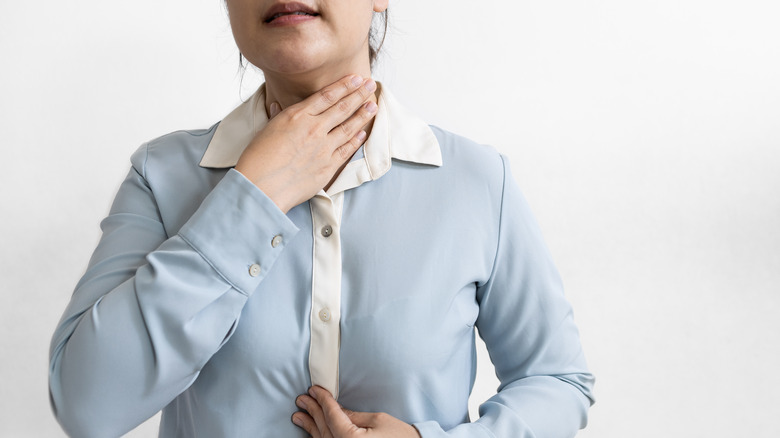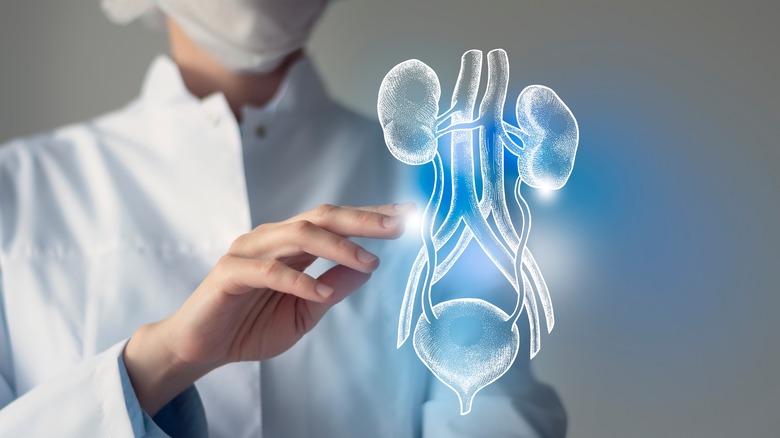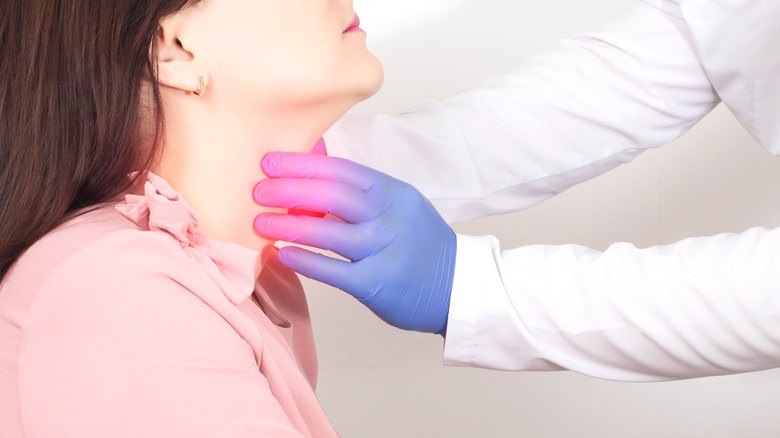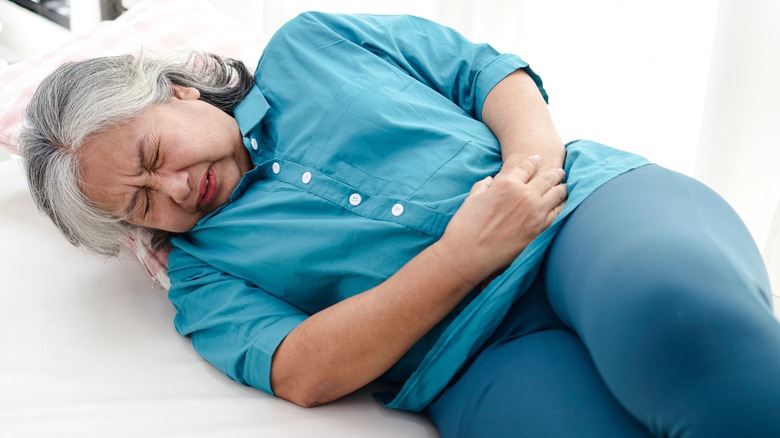What Causes Strictures?
Maybe you've heard of a stricture before, or perhaps the term is completely new to you. In the realm of medical conditions, the term is used to describe a variety of issues and diagnoses. By definition, stricture means to restrict something, and in the medical world, it usually refers to the restricted narrowing of a passageway, per RxList. Specifically, a medical stricture is an internal part of the body that is narrowed by an entity, and sometimes the term is used to describe the act of narrowing within a tube, canal, or duct.
Expanding on the definition, a stricture can also refer to the constriction of hollow organs, like the urethra, ureter, and esophagus or other parts of the body's airways (via Taber's Medical Dictionary). The causation of strictures is divided into two categories, acquired and congenital. The latter, a congenital stricture, is rooted in genetics, whereas an acquired stricture forms due to the buildup of a substance, a foreign object that causes constriction, injury, or infection, among other reasons. Tumors and scar tissue, particularly following injury or surgery, are two common reasons why acquired strictures occur throughout the body (per RxList). To determine the exact cause of a stricture, the type of stricture and body part affected must be considered. Here's what you should know about what causes different types of strictures.
Urethral strictures
If you find it painful to go to the bathroom, particularly when it comes to urinating, then you may have a urethral stricture. According to Mayo Clinic, urethral strictures most often occur when scar tissue forms and subsequently narrows the urethra, the tube-like passageway that dispenses urine from the body. Since the path in which urine must follow to exit the body becomes blocked, common symptoms experienced by people with urethral strictures include the inability to fully empty one's bladder, the need to strain or force oneself during urination, an uncontrolled or chaotic stream of urine, and a constant need to urinate due to being unable to completely empty during each visit to the bathroom. Side effects of urethral strictures include infections, particularly urinary tract infections (UTIs).
Urethral strictures are usually acquired strictures, often from trauma or as a result of another medical condition, per Mount Sinai. Scar tissue that develops following the placement of a urethral catheter, or complications from radiation can cause urethral strictures. If you need an additional sign to practice safe sex, there are several sexually transmitted diseases (STDs), particularly gonorrhea, that can lead to the development of a urethral stricture. Treatment options for the condition include surgical and nonsurgical routes (via Healthline). Dilation methods are used to widen the blocked urethra during outpatient procedures, and permanent urinary catheters can also be implanted through nonsurgical methods. In severe cases of urethral stricture, surgery is necessary. Always consult with your doctor if you have concerns.
Esophageal strictures
When you swallow food, you rely on your esophagus to be a clear pathway to your stomach. However, when an esophageal stricture is present you may experience painful swallowing or even risk choking, reports Cleveland Clinic. Esophageal strictures are defined as malignant or benign. Malignant esophageal strictures are caused by cancers and the formation of tumors in the esophagus results in the narrowing of the esophageal passageway. Benign, or non-cancerous, esophageal strictures have many causes, though gastroesophageal reflux disease (GERD) is a common reason esophageal strictures occur. Other causes involve eosinophilic esophagitis, an immune system issue that provokes allergic reactions and esophageal inflammation, scar tissue from surgeries, and effects of radiation treatment used on the head or neck. Excessive alcohol consumption raises a person's risk of experiencing an esophageal stricture. Regardless of the cause, symptoms of esophageal strictures often include sensations of burning or pain in the throat, which can occur both when swallowing and at other times throughout the day, feeling like something is stuck in the throat, and a high number of choking incidents. The majority of esophageal stricture cases occur in patients over age 40, though younger people can also experience the condition.
Just like urethral strictures, esophageal strictures can also be treated through a procedure that creates dilation and opening of the narrowed passageway (via UCLA Health). For esophageal strictures, multiple sessions of dilation may be necessary to fully treat the blocked area. Corticosteroid injections are another treatment option for esophageal strictures.
Colon strictures
Like other tube-shaped parts of the body, the colon and intestines that make up the gastrointestinal (GI) tract can be affected by strictures. Specifically, a colon stricture occurs within the large intestine and can result in difficulty passing stool (via Drugs.com). Symptoms of colon strictures are frequently reported as severe abdominal pain, cramping, upset stomach, vomiting, and constipation often accompanied by a distended belly and cramping. Colon strictures have many causes, though unlike other forms of strictures, there are several pre-existing underlying conditions that habitually lead to colon strictures. Conditions, like Crohn's disease and inflammatory bowel disease (IBS), commonly lead to colon strictures, as do hernias and tumors located within the gastrointestinal tract.
A condition called volvulus, in which the colon wraps or loops around itself, is another cause of colon strictures, according to Medical News Today. The people most at risk of volvulus and subsequent colon strictures are men over the age of 60, though anyone can be diagnosed with the colorectal condition. To diagnose volvulus, as well as other conditions resulting in colon strictures, medical imaging, like x-rays and MRIs, are generally used to obtain visuals of the afflicted intestines. When a colon stricture is present and internal causing blockages of stool or other intrusive symptoms, a surgical procedure called strictureplasty can be used to remove scar tissue and other components creating narrowing of the large intestine and gastrointestinal tract, per Stanford Medicine Health Care. For all types of strictures, consult your doctor for individualized options.




